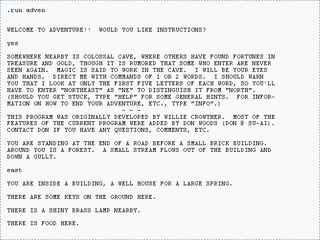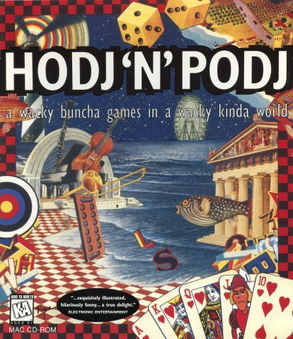Infocom was an American software company based in Cambridge, Massachusetts, that produced numerous works of interactive fiction. They also produced a business application, a relational database called Cornerstone.

Interactive fiction, often abbreviated IF, is software simulating environments in which players use text commands to control characters and influence the environment. Works in this form can be understood as literary narratives, either in the form of interactive narratives or interactive narrations. These works can also be understood as a form of video game, either in the form of an adventure game or role-playing game. In common usage, the term refers to text adventures, a type of adventure game where the entire interface can be "text-only", however, graphic text adventures still fall under the text adventure category if the main way to interact with the game is by typing text. Some users of the term distinguish between interactive fiction, known as "Puzzle-free", that focuses on narrative, and "text adventures" that focus on puzzles.

Zork is a text-based adventure game first released in 1977 by developers Tim Anderson, Marc Blank, Bruce Daniels, and Dave Lebling for the PDP-10 mainframe computer. The original developers and others, as the company Infocom, expanded and split the game into three titles—Zork I: The Great Underground Empire, Zork II: The Wizard of Frobozz, and Zork III: The Dungeon Master—which were released commercially for a range of personal computers beginning in 1980. In Zork, the player explores the abandoned Great Underground Empire in search of treasure. The player moves between the game's hundreds of locations and interacts with objects by typing commands in natural language that the game interprets. The program acts as a narrator, describing the player's location and the results of the player's commands. It has been described as the most famous piece of interactive fiction.

Steven Eric Meretzky is an American video game developer. He is best known for creating Infocom games in the early 1980s, including collaborating with author Douglas Adams on the interactive fiction version of The Hitchhiker's Guide to the Galaxy, one of the first games to be certified "platinum" by the Software Publishers Association. Later, he created the Spellcasting trilogy, the flagship adventure series of Legend Entertainment. He has been involved in almost every aspect of game development, from design to production to quality assurance and box design.

The Game Developers Choice Awards are awards annually presented at the Game Developers Conference for outstanding game developers and games. Introduced in 2001, the Game Developers Choice Awards were preceded by the Spotlight Awards, which were presented from 1997 to 1999. Since then, the ceremony for the Independent Games Festival is held just prior to the Choice Awards ceremony.
Legend Entertainment Company was an American developer and publisher of computer games, best known for creating adventure titles throughout the 1990s. The company was founded by Bob Bates and Mike Verdu, both veterans of the interactive fiction studio Infocom that shut down in 1989. Legend's first two games, Spellcasting 101: Sorcerers Get All the Girls and Timequest, had strong sales that sustained the company. Legend also profited from negotiating licenses to popular book series, allowing them to create notable game adaptations such as Companions of Xanth and Gateway. Legend also earned a reputation for comedic adventures, with numerous awards for Eric the Unready in 1993. As the technology of the game industry changed, Legend continued to expand its game engine to take advantage of higher graphical fidelity, mouse support, and the increased media storage of the compact disc.

A Mind Forever Voyaging (AMFV) is a 1985 interactive fiction game designed and implemented by Steve Meretzky and published by Infocom. The game was intended as a polemical critique of Ronald Reagan's politics.

The Game Developers Conference (GDC) is an annual conference for video game developers. The event includes an expo, networking events, and awards shows like the Game Developers Choice Awards and Independent Games Festival, and a variety of tutorials, lectures, and roundtables by industry professionals on game-related topics covering programming, design, audio, production, business and management, and visual arts.

The International Game Developers Association (IGDA) is a nonprofit professional association whose stated mission is to "support and empower game developers around the world in achieving fulfilling and sustainable careers."

Planetfall is a science fiction themed interactive fiction computer game written by Steve Meretzky, and the eighth title published by Infocom in 1983. The original release included versions for Apple II, Atari 8-bit family, TRS-80, and IBM PC compatibles. The Atari ST and Commodore 64 versions were released in 1985. A version for CP/M was also released. Although Planetfall was Meretzky's first title, it proved one of his most popular works and a best-seller for Infocom; it was one of five top-selling titles to be re-released in Solid Gold versions including in-game hints. Planetfall uses the Z-machine originally developed for the Zork franchise and was added as a bonus to the "Zork Anthology".

Raphael "Raph" Koster is an American entrepreneur, game designer, and author of A Theory of Fun for Game Design. Koster is widely recognized for his work as the lead designer of Ultima Online and the creative director behind Star Wars Galaxies. From 2006 until 2013 he worked as the founder and president of Metaplace producing a Facebook game platform.

Boffo Games was a video game developer founded in 1994 by Steve Meretzky, Mike Dornbrook, and Leo DaCosta. The logo was designed by Gayle Syska, formerly of Infocom. Boffo produced two games, Hodj 'n' Podj and The Space Bar, before closing its doors in 1997. Hodj 'n' Podj was originally designed for Media Vision but it divested all of its multimedia interests following a securities-fraud scandal and the title was purchased by Virgin Interactive. The Space Bar was originally to be published by Rocket Science Games (RSG) but SegaSoft bought out RSG and became the game's publisher.

The Space Bar is a 1997 graphic adventure game developed by Boffo Games and published by Rocket Science Games and SegaSoft. A comic science fiction story, it follows detective Alias Node as he searches for a shapeshifting killer inside The Thirsty Tentacle, a fantastical bar on the planet Armpit VI. The player assumes the role of Alias and uses his Empathy Telepathy power to live out the memories of eight of the bar's patrons, including an immobile plant, an insect with compound eyes and a blind alien who navigates by sound. Gameplay is nonlinear and under a time limit: the player may solve puzzles and gather clues in any order, but must win before the killer escapes the bar.

Stieg Hedlund is a computer and video game designer, artist, and writer. He has worked on more than thirty games in the video game industry. He is best known for his work in action RPGs, and has also worked on games on real-time strategy, tactical shooter, beat-'em-up and action-adventure games.

Hodj 'n' Podj is a 1995 computer board game and minigame compilation developed by Boffo Games and published by Media Vision and Virgin Interactive. It was designed by Steve Meretzky, previously known for adventure games such as The Hitchhiker's Guide to the Galaxy. Hodj 'n' Podj features 19 minigames based on peg solitaire, Pac-Man, Battleship and other games. These may be played separately or within an overarching fairy tale story, which follows the suitors Hodj and Podj in their attempts to rescue two princesses.

Spellcasting 101: Sorcerers Get All the Girls is a 1990 adventure game. It was the first installment of the Spellcasting series created by Steve Meretzky during his time at Legend Entertainment. All three games in the series tell the story of young Ernie Eaglebeak, a student at the prestigious Sorcerer University, as he progresses through his studies, learning the arcanes of magic, taking part in student life, and meeting beautiful women.

The text adventure game Spellcasting 301: Spring Break is the third and last installment of the Spellcasting series created by Steve Meretzky during his time at Legend Entertainment. All three games in the series tell the story of young Ernie Eaglebeak, a student at the prestigious Sorcerer University, progressing through his studies, learning the arcanes of magic, taking part in student life, occasionally saving the world as he knows it, and having his way with any beautiful women he can get his hands on.
Spellcasting is a series of three interactive fiction games designed by Steve Meretzky during his time with Legend Entertainment. The games feature the character Ernie Eaglebeak, a student at the prestigious Sorcerer University. Spellcasting 101 is the first game created by Legend Entertainment, a hybrid graphical and text adventure format.

Christopher Erhardt was the Head of School - US Campuses for the Academy of Interactive Entertainment (AIE) from the time the school opened until his death. From 1998-2007 he was the Associate Dean as well as V.P.-Production at DigiPen Institute of Technology in the United States.
Michael Verdu is an American manager and producer and author of computer games.

















